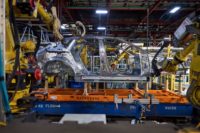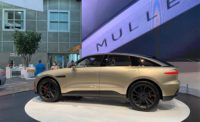MUNICH—The BMW Group is speeding up the shift toward electromobility and strengthening its global production network. As part of the 400 million euro initiative, the automaker is retooling its assembly plants for an electrified future.
Among the changes, BMW is building a new electric vehicle assembly plant at its flagship manufacturing complex in Munich. The state-of-the-art facility will be built on the site of a plant currently used to produce four- and six-cylinder internal combustion engines (ICEs).
The historic move will mark the end of an era at BMW, as the company stops producing ICEs in Germany. Once the transition is completed, assembly of gasoline- and diesel-powered engines will only take place in Steyr, Austria, and Hams Hall, England.
“We are systematically implementing our electrification strategy,” says Milan Nedeljković, member of the board of management responsible for production at BMW AG. “By the end of 2022, each of our German plants will be producing at least one fully electric vehicle.
“We are continually developing [our Munich factory] toward electromobility, creating efficient and competitive production structures for this purpose,” explains Nedeljković. “The decision to build a new assembly line at our almost 100-year-old plant shows that transformation can secure, and even create, industrial jobs in the heart of the city—if it is approached strategically, and with courage.
“Future assembly and production processes will be designed for a new cluster architecture geared toward electric drive trains,” adds Nedeljković. “This architecture will be in use from the middle of the decade. It will ramp up for the first time at our future plant in Debrecen, Hungary, before being rolled out across our global production network in stages.”
According to Nedeljković, all BMW employees will receive intensive training throughout the transition process. In fact, he claims that more than 50,000 people have already been trained as part of the automaker’s decade-long electromobility initiative.
BMW’s plant in Dadong, China, began producing the iX3 SUV earlier this year. Next year, the i4 sedan and iX SUV will roll off the assembly line in Munich and Dingolfing, respectively.
“Fully-electric variants of the new 7 Series and the future 5 Series are also ready to go in Dingolfing,” says Nedeljković. “Our Regensburg plant will start manufacturing the new X1 in 2022, which will be available both with an internal combustion engine and a fully-electric drive train. From 2023, the Leipzig plant, which has built the i3 electric car since 2013, will produce the successor to the Mini Countryman with a combustion engine and with a fully-electric variant.”
At the same time, BMW is ramping up its capacity to mass-produce electric drive trains. The company is investing in production equipment for highly integrated e-drives and high-voltage batteries at its Competence Center for E-Drive Production in Dingolfing. In addition, the Leipzig and Regensburg factories are currently in the process of setting up equipment to assemble battery modules.
“Allocating capacity in this way places a deliberate emphasis on the flexibility of our plants and makes them more efficient and more competitive,” says Nedeljković.



